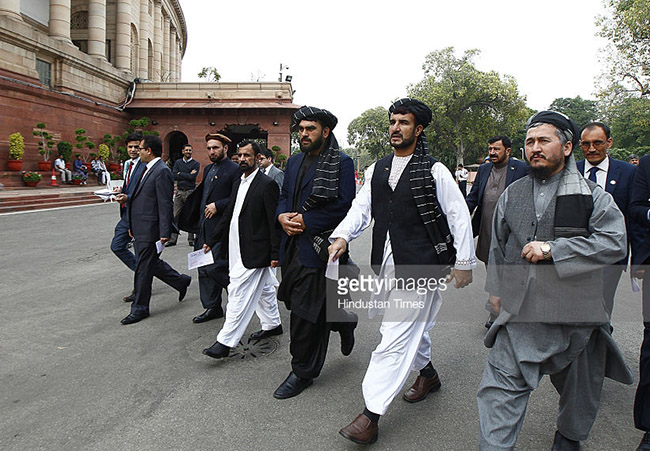Tolerance means not opposing one’s beliefs or behaviors maturely, which are disagreeable, despite having the authority and free will. Tolerance is based on particularly reasonable morality rather than being unconcerned without a reason behind. When parents do not react regarding their children’s impoliteness, it is called permissiveness rather than tolerance. In other words, tolerance means showing respect for the race, belief, age, gender, opinions, and ideologies of other people or groups. This concept means different things to different people, but it is when something is disagreeable that tolerance is expected, and in more politically correct cultures, demanded.
Violence is defined the antonym of tolerance. A society lacking tolerance, violence, bloodshed and cruelty emerge. As a result, a large number of Afghan ethnic and religious minorities lost their life for the sake of their faith and creed under the Taliban. The Taliban’s dogmatic faith and lack of tolerance led to national carnage across the country and yet Afghan citizens lose their lives in terrorist acts. The acts of terror carried out by the Taliban and self-styled Islamic State (IS) group stem from lack of tolerance.
It is believed that there are two major factors in breeding intolerance. Stereotype is one of the main reasons behind intolerance. For example, whenever we do not have a good understanding of a group, culture, people, etc. then we tend to make assumptions about them. Stereotyping makes people generalize things. Because these assumptions are made with very little true knowledge, most often they are false. People generally stereotype out of bias against a particular group of people or ethnic minority. Stereotyping becomes a way of conveying their dislikes.
Ethnocentrism is the second factor for creating intolerance. Ethnocentrism is the tendency to believe that one’s ethnic or cultural group is centrally important, and that all other groups are measured in relation to one’s own. The ethnocentric individual will judge other groups relative to his or her own particular ethnic group or culture, especially with concern to language, behavior, customs and beliefs. These ethnic distinctions and sub-divisions serve to define each ethnicity’s unique cultural identity.
To know better, let’s see a simple example of ethnocentrism in English term barbarian. Originally a Greek word, the term was used to refer to tribes that lived around the edge of ancient Greek society. The Greeks referred to these people as barbars because they could not understand their speech. Bar-bar was the Greek word for the sound a dog makes, like the word bow-wow. The Greeks, in a classic example of ethnocentrism, considered those whose speech they could not understand to be on the same level as dogs, which also could not be understood. They did not grant such people the status of human being. Moreover, the term eskimo, used to refer to groups that inhabit the arctic and subarctic regions, is an Indian word used by neighbors of the Eskimos who observed their strange way of life but did not share it. The term means “eaters of raw flesh,” and as such is an ethnocentric observation about cultural practices that were normal to one group and repulsive to another.
In Afghanistan throughout the history, the ethnic minorities have suffered strong violence and bloodshed. The ethnocentric views resulted in racial tensions and, finally, in civil war which led to the deaths of thousands of individuals – including children, who have happened to be born within a certain group with a certain race and color. Moreover, thousands were displaced and many others emigrated from their homelands.
The social and political tolerance will be practiced in a society where human rights are acceptable in their modern term and where all the sources of power will tolerate the citizens’ belief, including the religious beliefs of minority groups, patiently. Honoring the beliefs and values of others means respecting the inherent personality of mankind.
We will pave the way for tolerance if we entitle one socially and politically for simply being human regardless of their belief, religion, ethnic origin or any other status. And when we grant the minorities equal rights, we believe the concept of human rights in modern way and respect the varieties of beliefs and moral values.
One may ask that shall we show tolerance towards those who harm us and take our lives such as the extremist groups, who spill the blood of people out of intolerance? In this regard, the answer is negative. When it comes to controversial issues, tolerance may also represent a “let’s agree to disagree” stance. It does not mean that a person has to accept or embrace words, actions, or ideas that are against his or her values or beliefs. It simply means that each person agrees to respect the other’s right to his or her feelings on the matter. When both sides have expressed their opinions, and it is obvious that neither is likely to change position, agreeing to disagree is often the most amicable outcome.
It is believed that nourishing tolerance will alleviate the pain and sufferings of societies wherein violence and militancy are going on. It should be noted that all individuals have the rights to life and liberty irrespective of being born in any culture, geography, race, etc. Hence, being born in a certain part of the world with certain backgrounds is neither a superiority nor inferiority. We are to live and let live.
Home » Opinion » Tolerance - A Panacea for Troubled Societies
Tolerance - A Panacea for Troubled Societies
| Hujjatullah Zia

